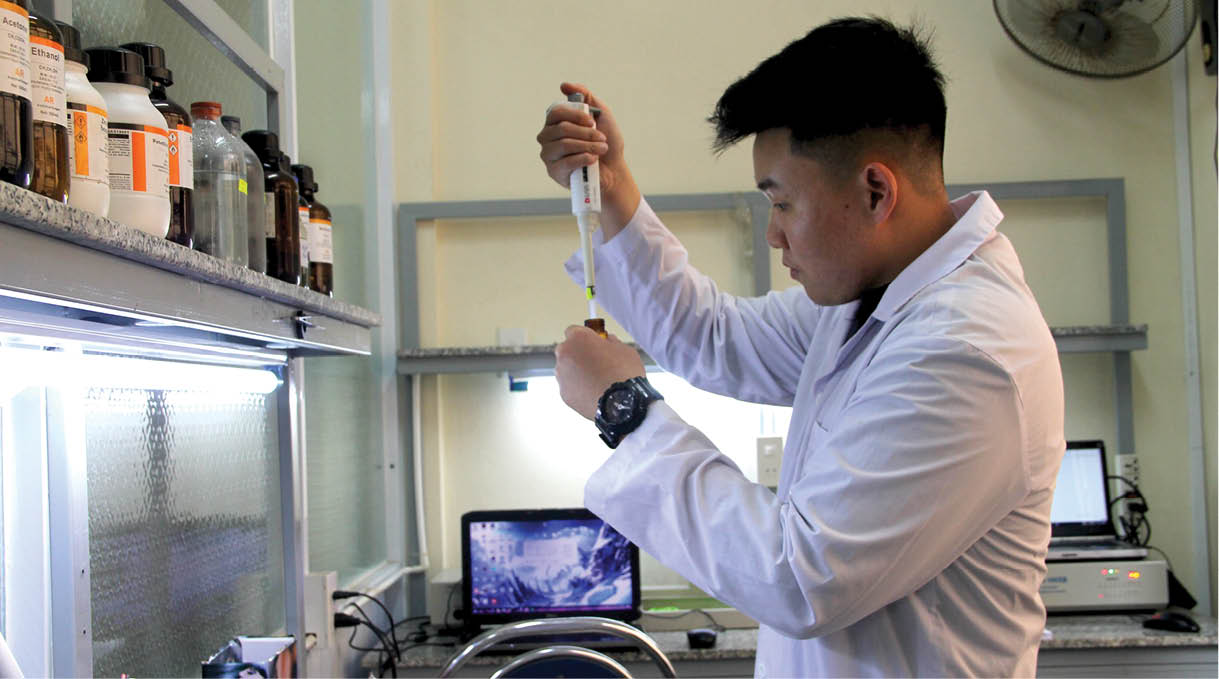
New generation of material being researched for high application in environmental pollution treatment
At present, the University of Science - Hue University has formed two outstanding research groups for conventional applied science studies. Many of their articles are regularly published on international journals.
In particular, the biotechnology team led by Prof. Dr. Nguyen Hoang Loc specializes in researching heterozygous manifestations in plants, some useful genes of microorganisms, the mechanism of molecular metabolism in the biosynthesis of bioactive compounds in endemic medicinal plants, and the heterozygous manifestations systems to produce valuable proteins and enzymes.
The chemistry group led by Prof. Dr. Dinh Quang Khieu specializes in researching new generation materials for environmental pollution treatment and environmental analysis.
Prof. Dr. Dinh Quang Khieu’s research team is operating in three main directions. The most notable one is the electrochemical analysis on the basis of composite material. “We research the electrode issues, or in other word, the probe. Currently, the theory of this topic has been internationally recognized. The team is researching to reduce the probe’s tip to obtain an appropriate sensitivity and size,” shared Prof. Khieu.
The graphene-based metal-organic framework material from the research can detect the Auramine o substance, which is a toxic industrial color, but many people still use it to soak bamboo shoots and chicken. In addition, it may indicate the Rhodamine-B red pigment commonly used in chili powder, melon seeds, and lipsticks.
The team also conducts experiments on oxide nanoparticles to analyze substances such as Clenbuterol (often used in manufacturing weight loss medications), Salbutamol (used in manufacturing pig gain-weight supplements)... Obtaining practical research, enriching the college’s research tradition and the establishment of outstanding research teams are great motivations for professors and their colleagues to devote to science.
Dr. Phan Tuan Anh, Deputy Head of the Office for Science, Technology and International Cooperation, University of Science, Hue University shares: “In general, the university’s outstanding research teams, after being officially recognized, have operated with many practical projects and topics. This is a firm step for lecturers and scientists to promote their strengths, and improve their research efficiency and quality”.
However, these outstanding teams also encounter difficulties, especially in research facilities that has failed to meet requirements of ensuring the novelty and preeminence of the topics. Meanwhile, the characteristics of scientific research must be absolutely accurate. Therefore, there are still many situations where the samples must be sent to labs in other provinces, or even other countries for processing and analyzing.
Also, due to this shortage in facility, Dr. Phan Tuan Anh desires to have a practical mechanism for outstanding research teams to use facilities of other member universities. As this policy is widely implemented, it is believed that scientific research will achieve optimal results under the best available conditions of experiment and facilities.
Sharing the upcoming practical research about the highly active carbon made from rice husk, Prof. Dr. Dinh Quang Khieu “reveals” that “the surface area, indices and activity of this carbon are much more optimal than those from peels of lemon and banana. The research will provide many practical applications in environmental treatment.”
It can be said that with practical topics, the outstanding research teams at the University of Sciences, Hue University is showing their key roles in scientific research activities, contributing to improving the position of the university with a great tradition of scientific research.
Story, photo: Mai Hue
